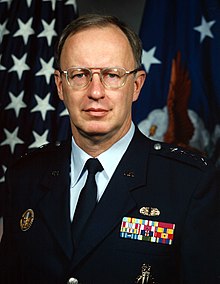John A. Gordon
| John Gordon | |
|---|---|
 |
|
| 2nd United States Homeland Security Advisor | |
|
In office April 30, 2003 – May 28, 2004 |
|
| President | George W. Bush |
| Preceded by | Tom Ridge |
| Succeeded by | Fran Townsend |
| Undersecretary of Energy for Nuclear Security | |
|
In office June 29, 2000 – June 27, 2002 |
|
| President |
Bill Clinton George W. Bush |
| Preceded by | Position established |
| Succeeded by | Linton Brooks |
| Deputy Director of Central Intelligence | |
|
In office October 31, 1997 – June 29, 2000 |
|
| President | Bill Clinton |
| Preceded by | George Tenet |
| Succeeded by | John McLaughlin |
| Personal details | |
| Born |
August 22, 1946 Jefferson City, Missouri, U.S. |
| Education |
University of Missouri, Columbia (BS) Naval Postgraduate School (MS) New Mexico Highlands University (MA) |
| Military service | |
| Allegiance |
|
| Service/branch |
|
| Years of service | 1968–2000 |
| Rank |
|
| Commands | 90th Strategic Missile Wing |
| Awards | Legion of Merit |
John Alexander Gordon (born August 22, 1946) was Deputy Director of the Central Intelligence Agency. He served as the President's Homeland Security advisor from 2003 to 2004.
Gordon entered the Air Force through the Reserve Officer Training Corps program in 1968. His early assignments were in research, development and acquisition where he was involved in improving the Minuteman Intercontinental Ballistic Missile (ICBM) and in developing and acquiring the Peacekeeper ICBM. He was a long-range planner at Strategic Air Command and served with the U.S. State Department in the Bureau of Politico-Military Affairs. Later, he commanded the 90th Strategic Missile Wing, the only Peacekeeper ICBM unit. He has served with the National Security Council in the areas of defense and arms control, including the oversight and completion of the START II negotiations. He then became a senior member of the secretary of defense's staff and later, the director of operations, Air Force Space Command, responsible for overseeing and developing policy and guidance for the command's operational missions. He also has served as special assistant to the Air Force chief of staff for long-range planning, where he was responsible for restarting and integrating a long-range planning process into the Air Force. Prior to assuming the deputy director position, he was associate director of central intelligence for military support, Central Intelligence Agency. He retired from the Air Force on August 1, 2000.
Following his Air Force retirement, Gordon was chosen as the first administrator of the National Nuclear Security Administration and also Under Secretary of Energy, responsible for the U.S. nuclear weapons program, a position he filled from June 2000 to June 2002. He next served as the Deputy National Security Advisor for Combating Terrorism, then assumed duties as Homeland Security Advisor from June 2003 to June 2004. On September 16, 2004, he was inducted into the Naval Postgraduate School Hall of Fame. In October, 2005 John A. Gordon, US Air Force, retired, former Homeland Security Advisor to the White House, and member of the Markle Foundation Task Force on National Security in the Information Age was appointed to the VirtualAgility, Inc. Board of Advisors. Gordon joined the board of EDO Corporation in early 2007, and also serves on the Board of Trustees of Analytic Services, Inc.
...
Wikipedia
